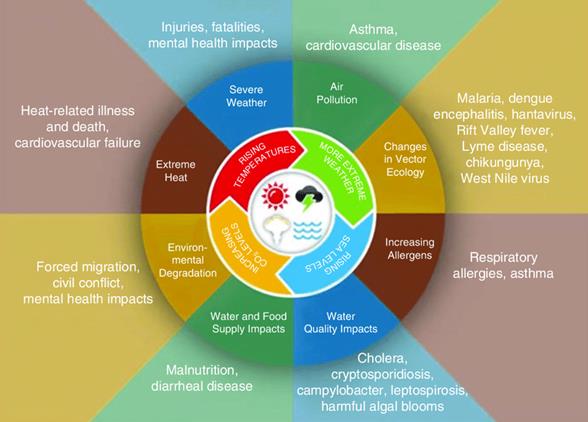Climate Change and Health, we must act now! 
Read our handbook to get engaged in action for change
Author: Eleanor Colreavy
Juggling the demands of course work, thinking about your future career, and exploring new experiences in unviersity is a lot. And you're doing all of this in College while time is ticking on climate change. Unfortunately, there’s no sugar-coating it: if we don't act now, climate change will be disastrous for health. You can read how in the image on the right, published by the Centre for Disease Control in the US.(1) and by reading our blog below which offers insights on the various ways climate change can affect our health, as well as the health and futures of generations to come.(2)
If you’re worried and want to take action on climate change, read our manual on Anxiety and Action .
Climate Change & Physical Health
Changes in temperature, rainfall patterns, and sea levels are causing all sorts of disruption that can impact our physical health in serious ways.(6)
It is well-known that climate change can impact our physical health.(3,4) Climate change is shaking up the basics we need to stay healthy. From the food we eat to the water we drink, the air we breathe, and the weather we experience, everything is being affected.(5) Changes in temperature, rainfall patterns, and sea levels are causing all sorts of disruption that can impact our health in serious ways.(6) Think about the extreme weather events we see on the news – scorching heatwaves, flooding, droughts, and intense hurricanes. These aren’t just news headlines; they can cause real harm. We’re talking about injuries, illnesses, and even fatalities.(7)
But it’s not just the obvious stuff. Climate change is also worsening things like air quality, which is bad news for our lungs and hearts. You might not notice it immediately, but poor air can exacerbate respiratory and cardiovascular diseases over time.(8) And those changes in weather? They’re messing with the habitats of insects and other organisms, potentially leading to an increase in infectious diseases.(9) Plus, as our environment changes, the risk of food contamination increases, leading to more cases of foodborne illnesses.(10)
The importance of physical activity for our health is also well established.(11) However, climate change is even putting that at risk. When it’s too hot to exercise outside or UV levels are too high, it becomes harder to stay active.(12) Likewise, climate and weather conditions present risks of injury and illness for those engaged in sports and outdoor activities.(12) For example, reports have highlighted the dangers of heat stress in widely practiced sports, including football, squash, golf, and cricket.(13) And it’s not just the athletes; UV radiation exposure is also a recognized health hazard for officials and spectators.(12) So, staying fit and healthy is getting tricker in this changing climate.
Climate Change & Mental Health: The Multi-Fold Impact
Warming is the most obvious sign of climate change, and research suggests it can negatively affect our psychological well-being.(6)
Climate change was traditionally viewed as a problem primarily affecting polar bears and other wildlife.(14) But it is increasingly recognised that climate change is no longer just an environmental problem – it’s a human problem too. Warming is the most obvious sign of climate change, and research suggests it can negatively affect our psychological well-being.(6) Studies have also shown a troubling link between higher temperatures and increased suicide rates.(15) But rising temperatures are not the only concern; poor air quality from climate change has been associated with psychological distress.(16) Plus, it can deter us from engaging in outdoor activities, which can impact our physical health, social connections, and ability to manage stress.(15) Climate change isn’t just about hotter days and bad air however – it’s also about job loss, forced relocations, and the breakdown of communities, all of which have serious impacts on our mental health.(17)
People are experiencing a rollercoaster of emotions in response to climate change, including sorrow, anger, irritation, isolation, fear, and despair.(18) Surveys in many countries have described high levels of worry and concern about climate change.(15) This worry arises from concerns about future environmental conditions, the loss of valued places and things, and potential future harm to their children.(19) Young people in particular seem to be significantly affected. In fact, fear of a future climate disaster is at the top of the list of worries for many young people around the world.(20) Furthermore, a global study revealed that about 60% of 10,000 young participants reported feeling anxious about climate change.(2)
Climate anxiety isn’t just a fleeting concern; it’s a profound emotional response to the crisis we’re facing. It may be prompted by grief about the loss of places and traditions, fears about the potential severity of climate impacts, and above all, the uncertainty about when, where, and how these effects will manifest.(15) While climate anxiety is a normal response to the climate crisis, it can shape how people view society and the future, often leading to feelings of anger or hopelessness, especially among young people.(2) Even those who are actively working to combat climate change can feel the weight of the crisis, often experiencing emotional burnout and despair.(17)
Climate Change: Safeguarding the Health of Future Generations
By 2050, it is estimated that an additional 24 million children will be undernourished because of climate change.(21)
While climate change affects us all, it hits hardest those who have done the least to cause it: children and the generations to come.(21) Unlike adults, children are still growing and developing, making them particularly vulnerable to the health impacts of climate change.(6) For example, children’s developing immune systems put them at increased risk of infection, while they are more vulnerable to heat stress, dehydration, and the harmful effects of air pollution and wildfire smoke.(1) Furthermore, the education of roughly 38 million children is being disrupted each year by the climate crisis.(21) This disruption not only impacts their learning today, but also their chances of securing good jobs and incomes in the future.
Looking ahead, the picture is even more concerning. By 2050, it is estimated that an additional 24 million children will be undernourished because of climate change.(21) Our changing climate will affect where and how we can grow food, leading to less availability and poorer nutrition.(22) Water availability will become more variable, leading to flooding in some areas and severe droughts in others.23 Rising sea levels may force coastal communities to relocate, leading to large-scale migrations as people escape climate disasters or political turmoil related to resource shortages.(23) As a result, young people have reported their reluctance to procreate because of their fears about the future environment for their children.(24) If we continue to delay serious action on reducing greenhouse gas emissions, today’s children and future generations will face a tough future – one where the impacts of climate change are more severe and far-reaching.

Want to do something about Climate and Health?
All this makes for pretty depressing reading. But it’s not too late to act. There’s a whole community of people working on Climate and Health. If you’d like to take action, check out our manual on political organising.
Bibliography
- Better Health Channel (2021, May 11th). Climate change and health. https://www.betterhealth.vic.gov.au/health/healthyliving/climate-change-and-health)
- Hickman, C., Marks, E., Pihkala, P., Clayton, S., Lewandowski, R. E., Mayall, E. E., ... & Van Susteren, L. (2021). Climate anxiety in children and young people and their beliefs about government responses to climate change: a global survey. The Lancet Planetary Health, 5(12), e863-e873. https://doi.org/10.1016/S2542-5196(21)00278-3
- Berrang-Ford, L., Sietsma, A. J., Callaghan, M., Minx, J. C., Scheelbeek, P. F., Haddaway, N. R., ... & Dangour, A. D. (2021). Systematic mapping of global research on climate and health: a machine learning review. The Lancet Planetary Health, 5(8). https://doi.org/10.1016/S2542-5196(21)00179-0
- Rocque, R. J., Beaudoin, C., Ndjaboue, R., Cameron, L., Poirier-Bergeron, L., Poulin-Rheault, R. A., ... & Witteman, H. O. (2021). Health effects of climate change: an overview of systematic reviews. BMJ open, 11(6). https://doi.org/10.1136/bmjopen-2020-046333
- United States Environmental Protection Agency: City of Chicago (n.d.). Climate Impacts on Human Health. https://climatechange.chicago.gov/climate-impacts/climate-impacts-human-health#main-content)
- Ahdoot, S., Pacheco, S. E., Council on Environmental Health, Paulson, J. A., Ahdoot, S., Baum, C. R., ... & Trasande, L. (2015). Global climate change and children’s health. Pediatrics, 136(5), e1468-e1484. https://doi.org/10.1542/peds.2015-3233
- Mills NL, Donaldson K, Hadoke PW, Boon NA, MacNee W, Cassee FR, Sandström T, Blomberg A, Newby DE. Adverse cardiovascular effects of air pollution. Nat Clin Pract Cardiovasc Med. 2009 Jan;6(1):36-44. doi: 10.1038/ncpcardio1399. Epub 2008 Nov 25. PMID: 19029991.
- Hunter PR. Climate change and waterborne and vector-borne disease. J Appl Microbiol. 2003;94 Suppl:37S-46S. doi: 10.1046/j.1365-2672.94.s1.5.x. PMID: 12675935.
- Rose JB, Epstein PR, Lipp EK, Sherman BH, Bernard SM, Patz JA. Climate variability and change in the United States: potential impacts on water- and foodborne diseases caused by microbiologic agents. Environ Health Perspect. 2001 May;109 Suppl 2(Suppl 2):211-21. doi: 10.1289/ehp.01109s2211. PMID: 11359688; PMCID: PMC1240668.
- Lake IR, Gillespie IA, Bentham G, Nichols GL, Lane C, Adak GK, Threlfall EJ. A re-evaluation of the impact of temperature and climate change on foodborne illness. Epidemiol Infect. 2009 Nov;137(11):1538-47. doi: 10.1017/S0950268809002477. Epub 2009 Apr 17. PMID: 19371450.
- Australian Institute of Health and Welfare (2000). Australia's Health 2000: the seventh biennial health report of the Australian Institute of Health and Welfare, Canberra. https://www.aihw.gov.au/reports/australias-health/australias-health-2000/contents/table-of-contents
- Townsend, M., Mahoney, M., Jones, J. A., Ball, K., Salmon, J., & Finch, C. F. (2003). Too hot to trot? Exploring potential links between climate change, physical activity and health. Journal of Science and Medicine in Sport, 6(3), 260-265. https://doi.org/10.1016/S1440-2440(03)80019-1
- Finch, C. F., Elliott, B. C., & McGrath, A. C. (1999). Measures to prevent cricket injuries: an overview. Sports Medicine, 28, 263-272. https://doi.org/10.2165/00007256-199928040-00004
- Born, D. (2019). Bearing witness? Polar bears as icons for climate change communication in National Geographic. Environmental Communication, 13(5), 649-663. https://doi.org/10.1080/17524032.2018.1435557
- Clayton, S. (2021). Climate change and mental health. Current Environmental Health Reports, 8, 1-6. https://doi.org/10.1007/s40572-020-00303-3
- Sass, V., Kravitz-Wirtz, N., Karceski, S. M., Hajat, A., Crowder, K., & Takeuchi, D. (2017). The effects of air pollution on individual psychological distress. Health & place, 48, 72-79. https://doi.org/10.1016/j.healthplace.2017.09.006
- Haase, E. (2023, May). Climate Change and Mental Health Connections. https://www.psychiatry.org/patients-families/climate-change-and-mental-health-connections
- Marczak., M., Winkowska, M., Chaton-Østlie K., Morote, R., & Klöckner, C. (2022) “When I say I'm depressed, it's like anger.” An exploration of the emotional landscape of climate change concern in Norway and its psychological, social and political implications. https://doi.org/10. 21203/rs.3.rs-224032/v2
- Wang, S., Leviston, Z., Hurlstone, M., Lawrence, C., & Walker, I. (2018). Emotions predict policy support: Why it matters how people feel about climate change. Global Environmental Change, 50, 25-40. https://doi.org/10.1016/j.gloenvcha.2018.03.002
- Stanley, F. (2022, April 7th). Climate change is our greatest health challenge – we must act to protect future generations. https://www.theguardian.com/commentisfree/2022/apr/07/climate-change-is-our-greatest-health-challenge-we-must-act-to-protect-future-generations
- Save the Children (n.d.). The Climate Crisis. https://www.savethechildren.org/us/what-we-do/emergency-response/climate-change#:~:text=Extreme%20events%20can%20destroy%20homes,choose%20between%20starvation%20and%20migration.
- Slingo, J. M., Challinor, A. J., Hoskins, B. J., & Wheeler, T. R. (2005). Introduction: food crops in a changing climate. Philosophical Transactions of the Royal Society B: Biological Sciences, 360(1463), 1983-1989. https://doi.org/10.1098/rstb.2005.1755
- Committee on Environmental Health. (2007). Global climate change and children's health. Pediatrics, 120(5), 1149-1152. https://doi.org/10.1542/peds.2007-2645
- McGinn, M. (2019). 2019’s biggest pop-culture trend was climate anxiety. Grist Magazine. https://grist.org/politics/2019s-biggest-pop-culture-trend-was-climate-anxiety/

